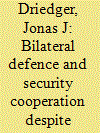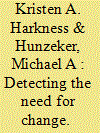|
|
|
Sort Order |
|
|
|
Items / Page
|
|
|
|
|
|
|
| Srl | Item |
| 1 |
ID:
177949


|
|
|
|
|
| Summary/Abstract |
With wavering US support and Brexit unfolding, cooperation between Germany, the EU's economic powerhouse, and the United Kingdom, Western Europe's prime military power, becomes crucial for Europe's overall ability to deal with a resurgent Russia. Does institutional and normative disintegration between states, such as the Brexit process, weaken bilateral security cooperation? This article argues that such cooperation persists if both states continue to jointly perceive a third actor as threatening while regarding each other as useful and reliable when it comes to ameliorating this shared threat. The argument is tested on a case of intrinsic theoretical, historical, and political importance: British-German cooperation towards Russia before and after the 2016 Brexit referendum. The article finds, against a wide pessimist consensus to the contrary, that cooperation strengthened during the Brexit process. As the Ukraine crisis had caused converging threat perceptions since 2014, Brexit incentivised both sides to signal ongoing reliability to each other and, consequently, to view each other as more capable allies. The article combines qualitative comparisons and congruence analysis, drawing data from British, German and Russian primary sources in their respective original languages, including foreign and security policy documents as well as interviews with stakeholders involved in policy formation.
|
|
|
|
|
|
|
|
|
|
|
|
|
|
|
|
| 2 |
ID:
177948


|
|
|
|
|
| Summary/Abstract |
This article addresses a gap in the literature on military adaptation by focusing on the first step in the adaptive process: detecting failure. We argue that institutionalised feedback loops are a critical mechanism for facilitating detection. Feedback loops are most effective when they filter information and distribute lessons learned to senior tactical commanders. In turn, effective filtration depends on incorporating frontline soldiers and specialists into intelligence cells while creating a protected space for dissent. We evaluate our theory against both irregular and conventional wars fought by the British Army: the counterinsurgency campaign in the Southern Cameroons (1960–1) as well as the evolution of British assault tactics on the Western Front of the First World War (1914–18).
|
|
|
|
|
|
|
|
|
|
|
|
|
|
|
|
| 3 |
ID:
177947


|
|
|
|
|
| Summary/Abstract |
Differences between women and men in perceptions of security threats are firmly established in public opinion research, with the ‘male warrior’ and the ‘worried woman’ two well-documented stereotypes. Yet, we argue in this article, the differences are not as well understood as such labels, or the search for explanations, imply. One reason for this is the lack of dialogue between public opinion research and feminist security studies. In bringing the two fields into conversation by analysing mixed methods research data gathered in Britain, we suggest that while the extent of the gender gap in opinions of security is overstated, the gaps that do exist are more complex than previously allowed: men and women define ‘security’ in slightly different ways; women tend to identify more security threats than men not necessarily because they feel more threatened but due to a greater capacity to consider security from perspectives beyond their own; women are more confident about the government's ability to deal with security threats in the future but not simply because of greater faith in government than men. This complexity implies a need to revisit assumptions, methods, and analytical approaches in order to develop the field of gender and security further.
|
|
|
|
|
|
|
|
|
|
|
|
|
|
|
|
| 4 |
ID:
177946


|
|
|
|
|
| Summary/Abstract |
In this article, we show how Annemarie Mol's notion of ontological politics helps to open up the research agenda for cyber security in Critical Security Studies. The article hence seeks to further the debate about STS and Critical Security Studies. The article's main claim is that the concept of ontological politics enables an engagement with the complex and transformative dynamics of ICT and the new security actors and practices that shape security politics in the digital age. By examining the virulent attacks executed by the Mirai botnet – one of the world's largest, fiercest, and most enduring botnets – we point to four aspects of cyber security that attention to the ontological politics of cyber security attunes us to: the proliferation and entanglement of security agencies, actors, sites, and spaces. These aspects of cyber security, we argue, are becoming increasingly prominent alongside the development of the Internet of Things (IoT) and 5G network technology. In conclusion, we discuss the wider security theoretical and normative-democratic implications of an engagement with the ontological politics of security by exploring three avenues for additional conversation between ontological politics and Critical Security Studies.
|
|
|
|
|
|
|
|
|
|
|
|
|
|
|
|
| 5 |
ID:
177945


|
|
|
|
|
| Summary/Abstract |
This article discusses the grand strategy imperatives of 37 foreign policy experts in Washington, DC in response to President Donald Trump's nationalist challenge to the post-Second World War international order concept. Using an abductive reconstructivist methodology to analyse in-depth interviews, five grand strategy imperatives, or rules for action, shared by all actors were identified: safeguarding US global leadership, maintaining alliances, securing US prosperity, orienting at values, and believing in a mission. Based on the interpretation of these rules for action, four types of foreign policy experts were distinguished: nationalists, realists, pragmatic liberals, and liberals. The latter three expert types, altogether labelled globalists, were united in their opposition to the nationalists’ demolition of the international order but divided along partisan and ideological lines about the meaning and implementation of the rules for action. Realists, pragmatic liberals, and liberals were also unsure of how to explain and respond to Trump's nationalism beyond a defensive or wishful hope to save the vestiges of an US-centric international order. The findings demonstrate the value of in-depth qualitative interviews for explaining elite beliefs and illustrate the rich insights for policy analysis that can be gained through this methodology.
|
|
|
|
|
|
|
|
|
|
|
|
|
|
|
|
| 6 |
ID:
177950


|
|
|
|
|
| Summary/Abstract |
Realist and rationalist approaches to balance of power politics underplay the degree to which balances are socially constructed. We develop a constructivist approach that accounts for the elusive and contentious nature of the balances that states seek to balance. The approach foregrounds contests over balance interpretations between states that shape whose conceptions and assessments underpin the making and remaking of balances. We argue that shifts in balancing practices are crucial to the dynamics of these contests. To substantiate this argument, we empirically study the contests over the conventional and theatre nuclear balances between East and West in the last two decades of the Cold War. The case study shows that the conventional and theatre nuclear arms control negotiations – that is, the partial shift from adversarial to associational balancing – initially fuelled and amplified both contests. At the same time, the arms control negotiations eventually resolved the contests through the development of shared understandings of the two balances, thus ending the adversarial balancing between East and West. Overall, we contribute to theory development on balance of power politics by highlighting the importance of contests over balance interpretations and by providing insights into the politics and dynamics that shape these contests.
|
|
|
|
|
|
|
|
|
|
|
|
|
|
|
|
|
|
|
|
|